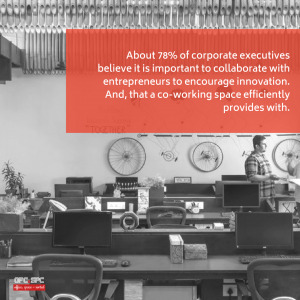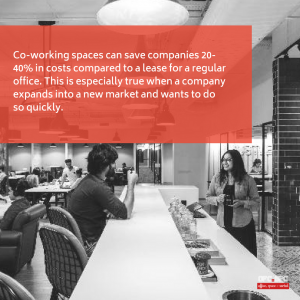The usage of co-working spaces by corporate organizations is on the rise. The components encouraging the trend include expanded adaptability, lowered costs, prominent emphasis on employees work values and the worldwide drive towards growth. Be that as it may, corporate have their own particular strategy with regards to working in a shared office. Before pitching in front of big brands and organizations, it is important to find out what are the reasons that bigger companies use such space and what are the focal points and weaknesses they find generally? Furthermore, what advantages and difficulties does this trend have on the procurer of co-working spaces?
 According to few industry experts, more corporate organizations will be becoming co-working members in the next couple of years. Bigger coworking conglomerates like WeWork, for example, has already established their spaces in every major city of India and is already attracting large organizations and MNCs to open their offices.
According to few industry experts, more corporate organizations will be becoming co-working members in the next couple of years. Bigger coworking conglomerates like WeWork, for example, has already established their spaces in every major city of India and is already attracting large organizations and MNCs to open their offices.
It’s can be easily expected that co-working spaces in Gurugram or Mumbai or Bengaluru are encountering higher quantities of corporate individuals who want to include co-working into as their work areas. The good news in all of this is that with the level of fine workspaces available in the metro and satellite cities, there is no fight between the smaller and bigger co-working spaces – everybody is adding their share of corporate clientele in their portfolio. Considerably smaller coworking aggregators have also begun running workspaces dedicatedly for corporate organizations, and in this way, both are able to create and set up newer connections.
Here are some of the major reasons these notable, big brands and organizations are moving towards co-working spaces:
Innovation on work projects and coordinated effort are highly motivating factors for organizations selecting co-working spaces. These two components are usually found in business systems and work as a fuel to the fire for organizations wishing to build up a ‘groundbreaking’ character for themselves. Corporate brands separate themselves against contenders by partnering with innovation and development. Organizations as such get better in adapting inventive business openings by working from a co-working space.
Not only this, but there are several other benefits of startups working alongside bigger organizations. Organizations bring their supply channels and wider market read and this experience are highly usable in building better products and understanding their respective industries in a better way. When there is a CXO level individual working in a dedicated desk next to yours, imagine the profound knowledge you get to earn. Several co-working spaces purposefully eye picking up bigger organizations as respectable clients so that they can frequently pick smaller enterprises and startups.
bring their supply channels and wider market read and this experience are highly usable in building better products and understanding their respective industries in a better way. When there is a CXO level individual working in a dedicated desk next to yours, imagine the profound knowledge you get to earn. Several co-working spaces purposefully eye picking up bigger organizations as respectable clients so that they can frequently pick smaller enterprises and startups.
Economic efficiency of an organization improves with time spent in a co-working space. Numerous corporates are turning towards co-working spaces to save their costs. This is a noteworthy driver for companies and the money-saving advantages and budgetary structures that the co-working provides are frequently disregarded. It’s not any more about the entrepreneurs, freelancers, and startups. Corporations comprehend the substantial, quantifiable advantages of shifting their teams in co-working spaces, and their way to utilize it more effectively.
By locating their teams inside co-working spaces, corporate organizations maintain a strategic distance from setup expenses and overheads. They don’t have to stress over furniture, networking, and office cleaning or administration expenses. Everything is being taken care of. It is not just the innovation at work why corporates are attracted to a co-working; essential cost savings are likewise driving this trend.
 In spite of the fact that the cost-cutting is a major reason, it can’t be generalized. There are still few corporate organizations that don’t use co-working spaces as a supplement or add-on to the real estate they already own. They utilize them to get closer to the businesses and professionals using them (who are highly probable to become their clients). The true value of a co-working space comes from its functional approach of being a shared office, where productivity is achieved by offering support networks and services. Without this, it is all like a flexible office rental market with greater risks due to short notice periods.
In spite of the fact that the cost-cutting is a major reason, it can’t be generalized. There are still few corporate organizations that don’t use co-working spaces as a supplement or add-on to the real estate they already own. They utilize them to get closer to the businesses and professionals using them (who are highly probable to become their clients). The true value of a co-working space comes from its functional approach of being a shared office, where productivity is achieved by offering support networks and services. Without this, it is all like a flexible office rental market with greater risks due to short notice periods.
Despite this, if organizations manage to use them well; co-working spaces can be more sustainable than a traditional corporate real estate. As the trend for more co-working spaces keeps on developing, we hope to see more corporate groups shifting away from the commercial real estate.


